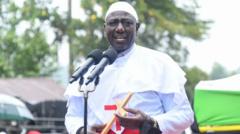Despite leading Kenya’s evangelical community to electoral victory, President William Ruto is grappling with a significant shift in the relationship between the church and state. Once seen as a protector of Christian values, Ruto now faces backlash from church leaders who accuse him of prioritizing greed over faithfulness, drawing comparisons to the biblical tax collector, Zacchaeus.
Ruto, who wore his Christian identity with pride, actively engaged with various denominations during his campaign, promoting the idea that religious support was instrumental to his election success. However, recent tax hikes and unfulfilled promises to the public have led to widespread discontent. The Kenyans, particularly the younger generation, have begun to challenge the church's complicity with political entities, urging religious leaders to speak out against perceived injustices.
The backlash was amplified during youth-led anti-tax protests that took over the nation in June, prompting church leaders to voice their frustrations openly. Figures like Teresia Wairimu and Rev. Tony Kiama condemned Ruto’s administration for worsening socio-economic conditions, and a powerful statement from the Catholic bishops accused his government of promoting a culture of lies, corruption, and oppression.
The breaking point materialized when bishops publicly rejected a donation from Ruto, citing ethical concerns and a desire to maintain the church's integrity. This rejection was seen as emblematic of a broader disillusionment with the government's actions. Moreover, the bishops’ criticisms resonated beyond Catholic circles, garnering support from various religious factions who once aligned with Ruto’s agenda.
Observers note this decline in the church's support for Ruto follows a historical trend where political leadership has sometimes co-opted religious institutions for their own ends. With Ruto’s increasing isolation and acknowledgment of the need for dialogue, the presidency's political future appears tenuous, particularly as he faces potential rebellion from within the ranks of his political stronghold.
Analysts suggest that Ruto’s approach to this widening rift will be pivotal. Engaging with church leaders may serve to restore his standing, yet failing to address their grievances could alienate a significant portion of the electorate unified by faith. As the current landscape shifts, the evangelical community, which aided his rise to power, may now become a crucial factor in determining his political viability in future elections. The challenge for Ruto will be to navigate this terrain without provoking the wrath of those who once championed him as a beacon of hope for Kenya.
Ruto, who wore his Christian identity with pride, actively engaged with various denominations during his campaign, promoting the idea that religious support was instrumental to his election success. However, recent tax hikes and unfulfilled promises to the public have led to widespread discontent. The Kenyans, particularly the younger generation, have begun to challenge the church's complicity with political entities, urging religious leaders to speak out against perceived injustices.
The backlash was amplified during youth-led anti-tax protests that took over the nation in June, prompting church leaders to voice their frustrations openly. Figures like Teresia Wairimu and Rev. Tony Kiama condemned Ruto’s administration for worsening socio-economic conditions, and a powerful statement from the Catholic bishops accused his government of promoting a culture of lies, corruption, and oppression.
The breaking point materialized when bishops publicly rejected a donation from Ruto, citing ethical concerns and a desire to maintain the church's integrity. This rejection was seen as emblematic of a broader disillusionment with the government's actions. Moreover, the bishops’ criticisms resonated beyond Catholic circles, garnering support from various religious factions who once aligned with Ruto’s agenda.
Observers note this decline in the church's support for Ruto follows a historical trend where political leadership has sometimes co-opted religious institutions for their own ends. With Ruto’s increasing isolation and acknowledgment of the need for dialogue, the presidency's political future appears tenuous, particularly as he faces potential rebellion from within the ranks of his political stronghold.
Analysts suggest that Ruto’s approach to this widening rift will be pivotal. Engaging with church leaders may serve to restore his standing, yet failing to address their grievances could alienate a significant portion of the electorate unified by faith. As the current landscape shifts, the evangelical community, which aided his rise to power, may now become a crucial factor in determining his political viability in future elections. The challenge for Ruto will be to navigate this terrain without provoking the wrath of those who once championed him as a beacon of hope for Kenya.



















